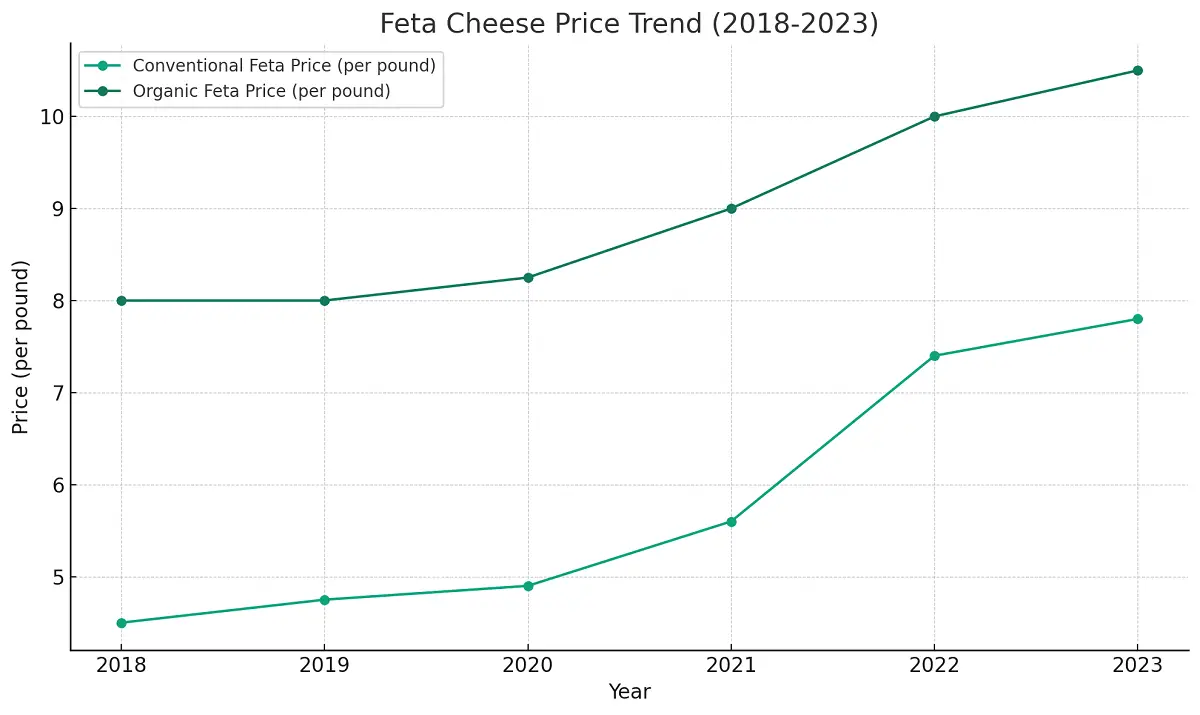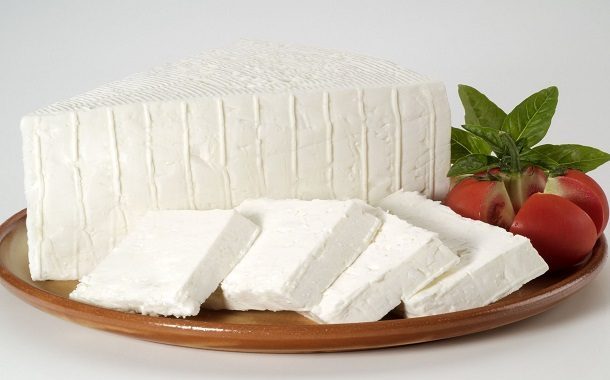How Much Does Feta Cheese Cost?
Last Updated on March 28, 2024
Written by CPA Alec Pow | Content Reviewed by ![]() CFA Alexander Popinker
CFA Alexander Popinker
Feta cheese is a soft, creamy, nutrient-rich cheese that comes from Greece and is originally made from sheep milk and goat milk, or a combination of the two has also become popular. This special environment is what gives the cheese its unique characteristics. The feta’s aroma is spicy and sharp when made with sheep milk, but it has a gentler taste when combined with goat milk. It has been used for a long time and every Greek meal includes it in one way or another.
How Much Does Feta Cheese Cost?
Expect to pay anywhere between $5 and $12 for one pound of fresh feta cheese if you buy it from a local grocery store or online. For instance, Parthenon Foods sells a 2-pound deli fresh block of feta cheese for $9 to $12.
In general, feta cheese is a product sold in blocks and its price is influenced by the amount you purchase, the geographical location, the shipping cost, brand, and quality.
At a local farmer’s market, you can find different types of feta cheese such as French, Bulgarian, and Greek. Fresh feta cheese sold at a local farmer’s market costs anywhere between $6 and $12 per pound.
Depending on the brand and quality of the cheese, you will have to pay anywhere between $7 and $15 for an 8-ounce container of feta cheese, usually found at a local grocery shop. For example, an 8-ounce container of President feta cheese costs $8 to $10.
You might also like our articles on the cost of cream cheese, Mozzarella cheese, or cheesecake.
According to some members of the Gardenweb.com forum, five ounces of feta cheese cost an average of $5, while for one pound you will have to pay around $13.
Feta cheese details
Feta cheese is classified as soft cheese made from 45% to 60% fat from the goat’s or sheep’s milk. The best varieties, the gourmet ones, are matured between 4-6 weeks, kept for a while in whey, and then in brine. It is also known as pickled cheese, and its fine flavor is accentuated over time. Most of the time, it is a creamy white cheese with very small holes, and a crumbly texture, and is found in square shapes. But you can also find pre-crumbled feta, packaged in airtight containers, without brine and with or without added spices.
Feta is a low-calorie, low-fat cheese. It also contains vitamins A and K, folic acid, pantothenic acid, iron, and magnesium. In addition, it contains more calcium and B vitamins than other cheeses such as mozzarella, ricotta, cottage cheese, or goat cheese.
It costs more than other regular cheeses, but if you only use it as a salad topping it will be totally worth it.
Important things related to feta cheese
Buy organic feta cheese to make sure you don’t consume chemicals or E’s.
Feta cheese is always white if stored properly. If it is yellow, it means that it has been exposed to air or that it is not the original feta cheese.
Until salted, the feta cheese should be kept in whey, and then, when packaged, the package should contain a little brine or oil, to keep it moist. It is recommended to be kept in the fridge, to keep it fresh, until the whole quantity is finished because if it dries it spoils immediately. This type of cheese can be kept in the refrigerator, in its own liquid, in sealed containers, but it is tastier when eaten fresh, at room temperature.
Consume feta cheese as such, with fresh vegetables such as cucumbers, tomatoes, and bell peppers. Put it in salads or as a topping on French fries, or on baked or boiled potatoes. Add it to sandwiches or make a creamy pasta sauce with it.
Regular consumption of feta cheese helps to strengthen your bone system, thanks to the calcium contained. Also, because it is rich in histidine and vitamin B6, feta cheese is also good for the immune system.
In addition, this range of cheeses also has probiotics, which work as a remedy to intestinal problems, but also vitamin B2, which relieves migraines. The iron and vitamin B12 found in feta cheese help you treat your anemia and prevent it.
Moderate consumption of feta may also be helpful if you have vision problems due to its high riboflavin content.
You have every reason to eat the famous feta cheese, so get ready to prepare delicious salads or vegetables that contain also this delicious ingredient.
But be careful not to eat it daily, because it is rich in sodium and has saturated fats.
Cost of Feta Cheese over the last 5 years
Here are some more detailed estimates on pricing trends from 2018-2023:
| Year | Conventional Feta Price (per pound) | Organic Feta Price (per pound) |
|---|---|---|
| 2018 | $4.50 | $8.00 |
| 2019 | $4.75 | $8.00 |
| 2020 | $4.90 | $8.25 |
| 2021 | $5.60 | $9.00 |
| 2022 | $7.40 | $10.00 |
| 2023 | $7.80 | $10.50 |
So from 2018 to 2023, conventional feta prices may rise by around 73%, while organic feta may increase by 31% over that period to these estimates.

Feta Cheese Price Trend
How will inflation affect the cost of Feta cheese in 2023
Inflation will likely be a key driver of higher feta cheese prices in 2023, though increases may moderate somewhat compared to 2022:
- Overall inflation is projected to ease slightly in 2023 versus historically high levels in 2022. However, it will remain elevated compared to pre-pandemic years.
- Dairy prices specifically are predicted to rise 5-7% in 2023 according to USDA forecasts, as feed, fuel, labor, and packaging costs remain high. This will push up feta cheese production costs.
- As milk and whey expenses rise for feta producers and importers, these higher costs get passed through the supply chain into retail pricing.
- However, if economic recession reduces consumer demand for premium-priced feta, it could temper inflationary impacts. Lower demand would constrain price growth.
- Supply chain disruptions, adverse weather, and disease outbreaks in dairy herds could also influence pricing.
- Overall, expect feta prices to increase around 5-10% in 2023 as inflation persists, but likely not as severely as the 15-20% spikes seen in 2022.
- Retail feta prices approaching $8-9 per pound conventional and $11-12 per pound organic are likely in 2023 based on these inflationary factors.
How can I save money?
The more you will buy, the more you are going to save per pound. Try to purchase feta cheese from a local warehouse retailer like Sam’s Club or Costco.
If you buy feta cheese from a local grocery store, look for coupons for well-known brands of feta cheese to see if you can save some dollars. For instance, the President brand offers from time to time a $5 discount on two containers, on third-party coupon printing websites, or on their own site.



Leave a Reply
Want to join the discussion?Feel free to contribute!